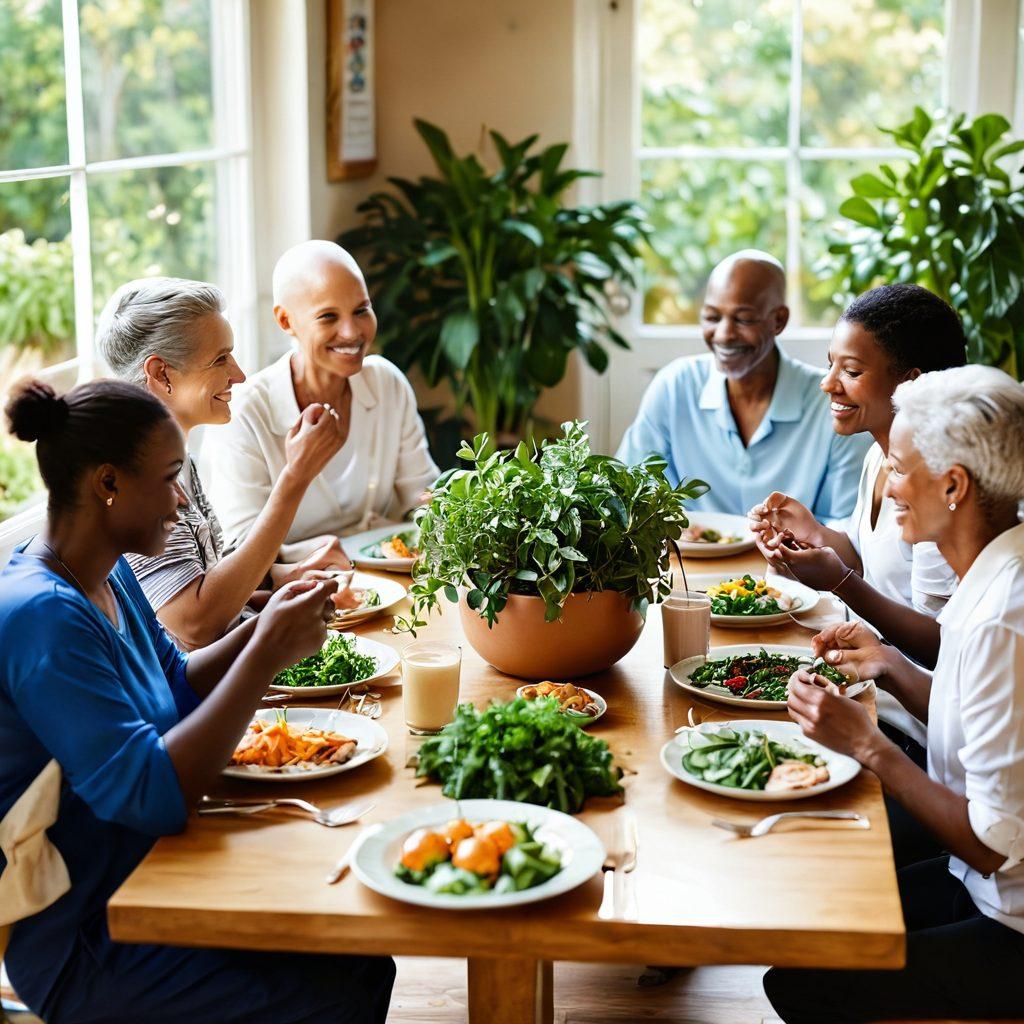Empowering Cancer Survivors: The Role of Nutrition, Support Groups, and Early Detection in Overcoming Malignancy
Harnessing the power of nutrition and community support is critical in the journey of cancer survivorship. Did you know that making the right dietary choices can significantly impact your well-being during and after cancer treatment? Many cancer survivors find that nutrition is a cornerstone of their recovery, serving not only as fuel for the body but also as a pathway to wellness. In the challenging landscape of oncology, where the shadows of carcinoma and malignancy can loom large, finding strength in diet and community can foster resilience. This is a journey we will explore together, delving into how nutrition and support can create a sanctuary for healing and vitality.
In today's healthcare environment, the conversation about cancer treatment is evolving. It's no longer solely about chemotherapy, radiation therapy, and immunotherapy; it’s also about how we can leverage lifestyle changes to enhance survivorship. The role of preventive health and early detection cannot be understated. Just think about it: what if a simple shift in your daily eating habits could lower your risk of developing new tumors or alleviate some of the symptoms of cancer? Incorporating more fruits, vegetables, and whole grains can not only bolster your immune system but also nourish your body during the recovery process. It’s empowering to acknowledge that healthy food choices are a form of advocacy for your own life and health.
Support groups can profoundly influence cancer survivorship by providing a sense of belonging and understanding that might otherwise feel elusive. Connecting with others who are walking similar paths can help demystify the emotional turmoil that often accompanies a cancer diagnosis. Imagine sharing your fears, hopes, and experiences in a safe space. How comforting is that? By engaging in these communities, patients not only have a platform to express their feelings but also discover new insights into managing the side effects of their treatment, coping tactics, and success stories of recovery. Research shows that being part of a supportive network significantly improves quality of life and can even enhance the outcomes of healthcare.
Moreover, the role of ongoing cancer research initiatives cannot be overstated. With each study, we draw closer to finding better treatments and understanding the nuances of cancer survivorship. For instance, the findings surrounding palliative care are revolutionizing how we approach cancer support, allowing us to focus on quality of life alongside treatment. In a world where cancer can feel like an unpredictable tempest, the lighthouse of knowledge beckons us to stay informed about emerging findings in oncological studies. The more we know, the better decisions we can make, fostering an environment where hope flourishes even in adversity.
To sum it all up, the journey of cancer survivorship is multifaceted, and it's essential to embrace the power of nutrition and community support. Together, they can provide a stabilizing force that allows survivors to reclaim their lives from the grips of carcinoma and malignancy. Let’s actively participate in our healthcare journey, advocate for ourselves and others, and ensure that the conversation around disease prevention continues. So, what steps will you take today to prioritize your health and possibly change tomorrow's narrative of your cancer story?
The Power of Early Detection: Transforming Lives through Proactive Cancer Care
In the realm of cancer care, the phrase 'the earlier, the better' takes on a new level of significance. Early detection of malignancy can not only save lives but also dramatically improve the quality of life for those facing the daunting journey of cancer treatment. Imagine being able to catch carcinoma in its infancy—simply through routine check-ups or symptom awareness—you could potentially turn the tide on a disease that once felt insurmountable. As we delve into the power of early detection, we will explore how proactive cancer care transforms not just statistics, but individual lives in the battle against cancer.
Consider for a moment the journey of a young woman named Sarah. In her late 30s, Sarah had always been health-conscious but had often brushed off her symptoms as merely stress-related. After joining a support group focused on cancer awareness, she was encouraged to schedule a health check-up—one that led to the early detection of a tumor that had started to develop unnoticed. As her story unfolds, we see how timely intervention through proactive healthcare can change the trajectory of cancer survivorship. This emphasizes that being aware of the early symptoms of cancer can literally mean the difference between life and death.
The beauty of early detection lies not just in the diagnostics but in the broader implications it has on treatment options. With advancements in oncological studies, treatments like immunotherapy, chemotherapy, and even radiation therapy can be deployed at earlier stages of malignancy—often yielding better outcomes. This holistic health approach that embraces early detection is a cornerstone of effective disease prevention and patient empowerment. The idea that lifestyle changes and regular healthcare checks play a role in outsmarting cancer fills one with hope and the realization that we all can take charge of our health journey.
But what if we take this conversation a step further? What if early detection wasn't just a personal responsibility, but a community-wide advocacy effort? The role of community support in enhancing cancer awareness cannot be overstated. When people come together to share knowledge, offer emotional backing, and promote preventive health strategies, they create a tapestry of resilience. Engaging in support groups fosters a culture where individuals do not navigate their challenges alone but rather unite to champion early detection and proactive healthcare.
As we continue to shed light on the significance of early detection, it is crucial to recognize the wider impact it has. Each life transformed through proactive cancer care sends ripples through families, communities, and even policy levels. The journey of cancer survivorship is fraught with challenges, yet the power of early detection can light a path toward better outcomes. So, let's champion cancer research initiatives and promote advocacy for healthcare practices that prioritize early screening, believing wholeheartedly that together, we can transform lives.
Community and Care: A Comprehensive Approach to Overcoming Malignancy Together
In the battle against malignancy, community and care serve as two powerful weapons. Picture this: a thriving group of cancer survivors who, instead of allowing their experiences to isolate them, band together to empower one another. After all, when illness seeks to uproot our lives, what better way to heal than through the shared strength found in community support? In oncology, understanding that no individual journey is the same fosters an atmosphere where healing can flourish, paving the way for renewed hope and resiliency. Through the lens of survivorship, we can transform our collective battle into a beacon of awareness and advocacy.
Support groups play a crucial role in navigating the complexity of cancer treatment. They become safe havens where patients and survivors exchange experiences, advice, and even laughter. Have you ever found solace in talking to someone who truly understands what you're going through? Whether it's discussing symptoms of cancer or the emotional toll of chemotherapy, these groups provide camaraderie. Remember, mutual support is not just about emotional comfort; it's also about sharing valuable insights related to nutrition and cancer. That delicious casserole you bring to the meeting might just change someone’s perspective on food during treatment!
As we delve into the world of cancer care, we cannot overlook the significance of early detection and preventive health strategies. Did you know that many carcinomas have a significantly higher success rate when caught early? This underscores the importance of regular screenings and awareness of the disease. It’s not just about treatment options like immunotherapy, radiation therapy, or palliative care; it’s also about recognizing potential symptoms in ourselves and others. Protecting our health begins with knowledge, and understanding that the signs of cancer are not just statistics—they are stories yet to be forged.
Nutrition is an integral aspect of cancer survivorship, resonating deeply with holistic health. The right dietary choices can bolster the body’s defenses against tumors while enhancing post-treatment recovery. Ever considered how your plate can be a canvas for change? Leafy greens, berries, and whole grains: these are more than simple foods; they are allies in our journey. Embracing lifestyle changes that promote well-being can become a shared mission through community support. After all, every meal can be a step toward empowerment and resilience.
Lastly, we must focus on the impact of cancer research initiatives in shaping patient support programs. The more we know about the disease, the better equipped we are to foster awareness and prevention. What if your story could spark change? By sharing your journey, whether through blogs, social media, or community events, you contribute to a larger dialogue about cancer and survivorship. Together, we can champion the importance of healthcare advocacy and create a world that embraces not just surviving, but thriving. Let’s unite in this cause—because when we stand together, we empower ourselves and each other against malignancy.


